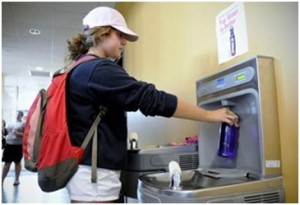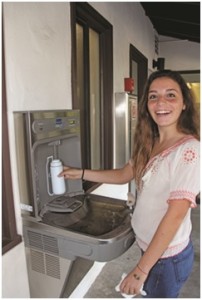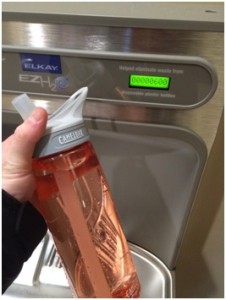College Initiative: World Water Day 2015
Posted on Wednesday, March 18th, 2015
 In conjunction with World Water Day (March 22nd) a twitter contest is being organized by S.E.A.T.S. (See Earth Action Team for Sustainability).
In conjunction with World Water Day (March 22nd) a twitter contest is being organized by S.E.A.T.S. (See Earth Action Team for Sustainability).
Students can participate by simply tweeting a photo of refilling a water bottle at one of the 30 refill stations at the Woodroffe campus or the Perth and Pembroke campuses.
To win, students will need to be following @ACSustainable, of course! Different prizes will be available to win over five days: March 23-27. (just after March 22, World Water Day and just before March 28, the day the world practices Earth Hour)
Check this list of water facts below, get #WaterAware and understand how water and climate are linked!
This campaign is aimed at promoting the responsible use of our water! Over 1 billion people don’t have access to clean water and are in need of support for affordable and accessible public water systems.
Water Facts:
- Every year 300-500 million tons of heavy metals, solvents, toxic sludge, and other wastes contaminate the world’s freshwater supply.
- Over 1 billion people don’t have access to clean water.
A 1 litre plastic bottle requires 3 – 5 litres of water to produce it. This is causing water shortages near bottling plants. - No touch water fill-ups reduce the spread of colds and flus. Refrigerated Bottle Filling Stations supply chilled, filtered, water from a no-touch bottle filling area.
- Transporting bottled water across hundreds and sometimes thousands of miles spews carbon dioxide into the air and contributes to climate change.
- Our landfills cannot support bottled water. 50 – 80% of plastic water bottles end up in landfills.30 billion plastic water bottles are thrown away every year. Plastic bottles take 400 to 1000 years for plastic bottles to decompose.
- Plastic bottles are collecting in big patches in our oceans. As they degrade, smaller pieces are being ingested by many aquatic animals causing them harm or death.
- Tap water guidelines are more stringent and thorough than any regulations for bottled water. A water bottling plant is inspected every 12 to 18 months. Public tap water is tested every 4 to 6 hours.
- The plastic bottles themselves contain chemicals that can leach out and contaminate the water. Exposure to extremely low doses of bisphenol A is strongly linked to diseases such as breast cancer, prostate cancer, and diabetes, and to reproductive and neurological development.
- The making of bottles and caps, the filling and packaging, the transportation, and the disposal of plastic water bottles uses enormous amounts of energy, burns fossil fuels and creates greenhouse gases.
- Water is a Human Right! The human right to water entitles everyone to sufficient, safe, acceptable, physically accessible and affordable water for personal and domestic uses.

Group leading initiative: See Earth Action Team for Sustainability
For more information, contact:
Kathryn Reilander, Algonquin College
613-727-4723
reilank@algonquincollege.com